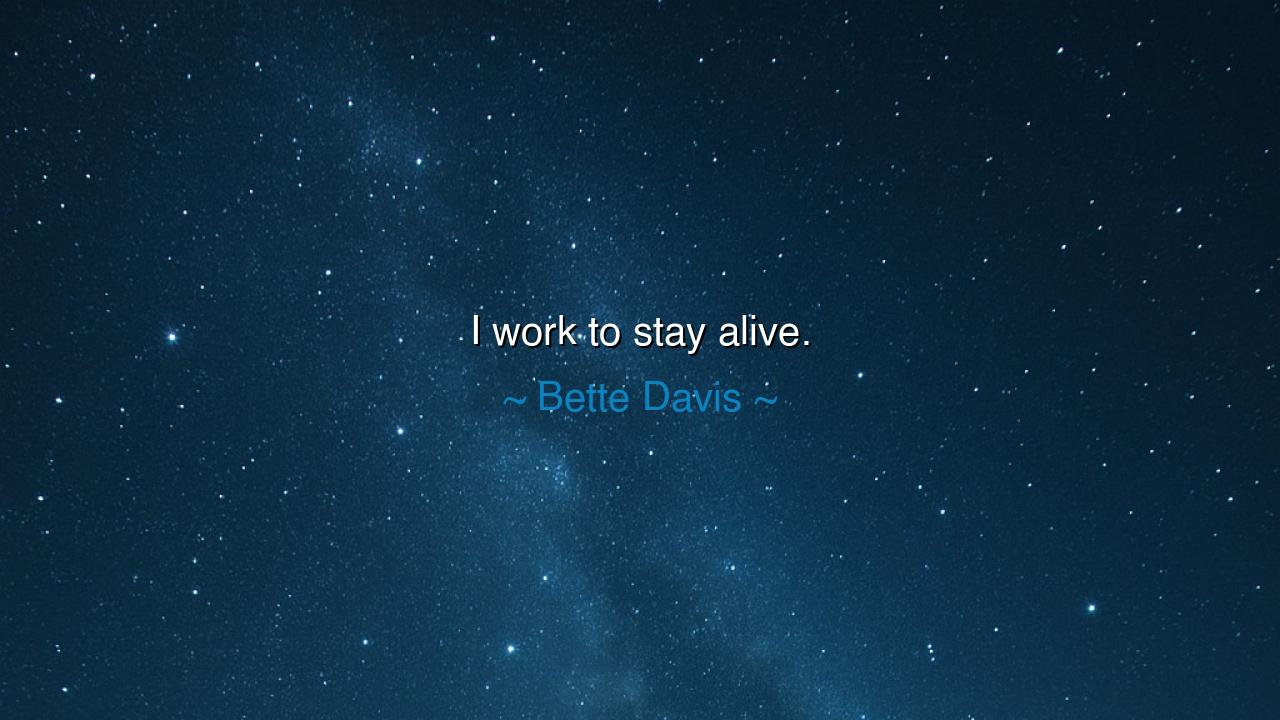
I work to stay alive.






Hear the words of Bette Davis, fierce spirit of the stage and screen, who declared with burning honesty: “I work to stay alive.” In this saying lies the ancient union between labor and life, for to work is not only to earn bread, but to keep the flame of the soul burning. Work, in its truest sense, is not mere survival of the body but the nourishment of purpose, without which the heart withers long before the flesh.
To stay alive is more than to draw breath—it is to remain vibrant, awake, aflame with meaning. Davis, who endured the harsh winds of fame and the battles of her craft, knew that her work was the anchor that held her spirit steady. In her labor she found not only sustenance, but vitality, identity, and resistance against despair. Thus, the phrase becomes more than necessity—it becomes a declaration of survival in both flesh and spirit.
Her words spring from the crucible of an artist’s life, where uncertainty, hardship, and loneliness often haunt the path. In such a life, work is not a burden but a salvation. Each role, each performance, each act of creation was for Davis a way of breathing more deeply, a way of proving that she was still alive in a world that often sought to crush individuality beneath indifference.
This teaching echoes through all ages: man was not made for idleness. Without work, the body grows frail, the mind restless, the soul hollow. But through work—be it in art, craft, or service—life is renewed each day. The ancients tilled their fields, carved their temples, painted their walls, not only to survive, but to affirm that they were alive, that their existence bore meaning.
Thus let it be remembered: to work to stay alive is not merely to endure the passage of days, but to transform them into something greater. Work is the song that keeps the spirit awake, the fire that drives back the shadows. Bette Davis, through this simple yet profound truth, offers to future generations a reminder: embrace your labor not as burden, but as the lifeblood that makes existence shine.






HADao Thai Hong An
Bette Davis’ quote brings a somber reality to the table. For many, work becomes more than a job – it becomes a necessity for survival. But at what cost? When we work solely to stay alive, are we truly living? Does the constant need to work drain us of creativity, joy, and connection? Can we redefine work as something that sustains our soul, rather than just our livelihood?
CBChi Cong Bui
I understand Bette Davis’ sentiment, especially in a world that often values productivity over well-being. But is working merely to survive the best way to live? Isn’t it possible that the obsession with work to stay alive prevents us from enjoying the present and truly connecting with what makes life meaningful? Can a life centered on work ever offer the fulfillment we seek, or should there be room for passion and leisure?
3T34.Thuy Trang
Bette Davis’ perspective on work reminds me of how many individuals find themselves trapped in cycles of endless work, just to stay afloat. But what does it say about the value of work if it's only about survival? Are we placing too much importance on working to live, rather than living to experience? Could there be a better balance where work and life are not opposing forces but collaborators in our overall well-being?
MCBui Ngoc Minh Chau
This quote feels like a reflection of the struggle many people face, where work becomes an escape or a way to simply get by. But should life really be reduced to just working to stay alive? Can’t we find ways to live with purpose and passion beyond just earning a living? At what point does this mindset of working to survive overshadow the need for personal growth, happiness, and connection?
KNNguyen Kieu Ngan
Bette Davis’ quote speaks to the idea of work being a necessity for survival, not just a choice. It makes me wonder – is work the only thing that keeps us 'alive,' or does it reflect the pressure that many people feel to keep going, even when they’re not truly living? What happens when work becomes a means to an end, rather than a source of fulfillment? How can we balance survival with true joy and meaning in our lives?